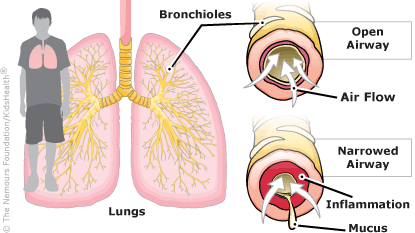Asthma and Sports Factsheet (for Schools)
What Teachers and Coaches Should Know
Asthma is a lung condition that causes breathing problems. Many kids and teens with asthma have symptoms when they participate in sports or exercise.
When a person has asthma, two things happen inside the lungs:
- constriction: the tightening of the muscles surrounding the airways
- inflammation: the swelling and irritation of the airways

Constriction and inflammation make the airways narrower, which may cause:
- wheezing
- coughing
- chest tightness
- shortness of breath
When this happens, it's called an asthma flare-up.
Students with asthma who exercise and play sports are more likely to have flare-ups. They also might:
- take daily asthma medicine using an inhaler, and need to take medicine during flare-ups
- take medicine before or during exercise
- need to take a break during exercise, practice, or games due to symptoms
- need to skip exercise, gym class, practice, or a game if a flare-up happens
Even though exercise may trigger asthma symptoms, students with asthma benefit from being active and playing sports.
But some sports may be better choices for people with asthma. Sports like baseball, golf, and shorter track and field events are less likely to trigger flare-ups. Endurance sports (like long-distance running and cycling) and those that require high-energy output without a lot of rest time (like soccer and basketball) can be more challenging for students with asthma. This is especially true for cold-weather sports, like cross-country skiing or ice hockey.
What Teachers and Coaches Can Do
Teachers and coaches should make sure that asthma is under control before students exercise or participate in sports. In other words, they shouldn't be having lots of flare-ups.
Ways to help students avoid flare-ups include:
- reminding them to carry and use their inhalers before activity, if the doctor recommends it
- allowing for extended warm-ups and cool-downs during practices and games
- watching out for flare-up symptoms and knowing when students should take breaks
Make sure your students with asthma have written instructions from their doctor (called an asthma action plan). This helps them prevent and manage flare-ups. You should know your students' asthma triggers and allow them to use their medicines when needed. If a student's symptoms don't improve or get worse after taking medicine, call the school nurse or 911.
Note: All information is for educational purposes only. For specific medical advice, diagnoses, and treatment, consult your doctor.
© 1995-2024 KidsHealth ® All rights reserved. Images provided by iStock, Getty Images, Corbis, Veer, Science Photo Library, Science Source Images, Shutterstock, and Clipart.com

